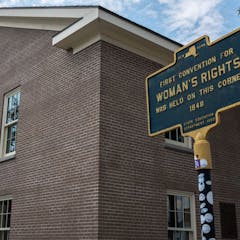
Articles on Quakers
Displaying all articles

This later generation of ‘conchies’ often felt torn between their duties to society and their beliefs amid a much more obvious battle between good and evil.

Most of the convention’s core organizers were Quakers. The religious movement’s beliefs about men and women’s equality before God has shaped members’ activism for centuries.

In formal consensus decision-making, no proposal is adopted until every concern is heard, understood and addressed. Here’s how it can work.

Eighteenth-century Quakers attempted to align their religious beliefs with what they purchased. These Quakers led some of the early campaigns against sugar being produced by enslaved people.

So-called Spiritualists split off from Martin Luther’s Reformation 500 years ago, but some of their ideas carry on.

No matter how well-intentioned, volunteers who may be inexperienced can’t solve the entrenched and complex social problems low-income communities endure.

Elizabeth Seton was canonized in 1975 as a saint. Charities founded by her continue her work with poor immigrants.

When it comes to engaging young people in their school studies, inclusivity means a lot.

For Gandhi, whose birth anniversary is Monday, Oct. 2, nonviolent resistance meant placing one’s own body in harm’s way to expose social injustices, which made it a powerful political tool.

Since the 19th century, a long line of black women preachers set in motion a tradition that spoke against injustices and questioned patriarchal attitudes. Here’s their story.

The government is unveiling commemorative paving stones laid in the birth places of those members of the British Empire forces in World War I who received the Victoria Cross for their bravery. The government’s…
